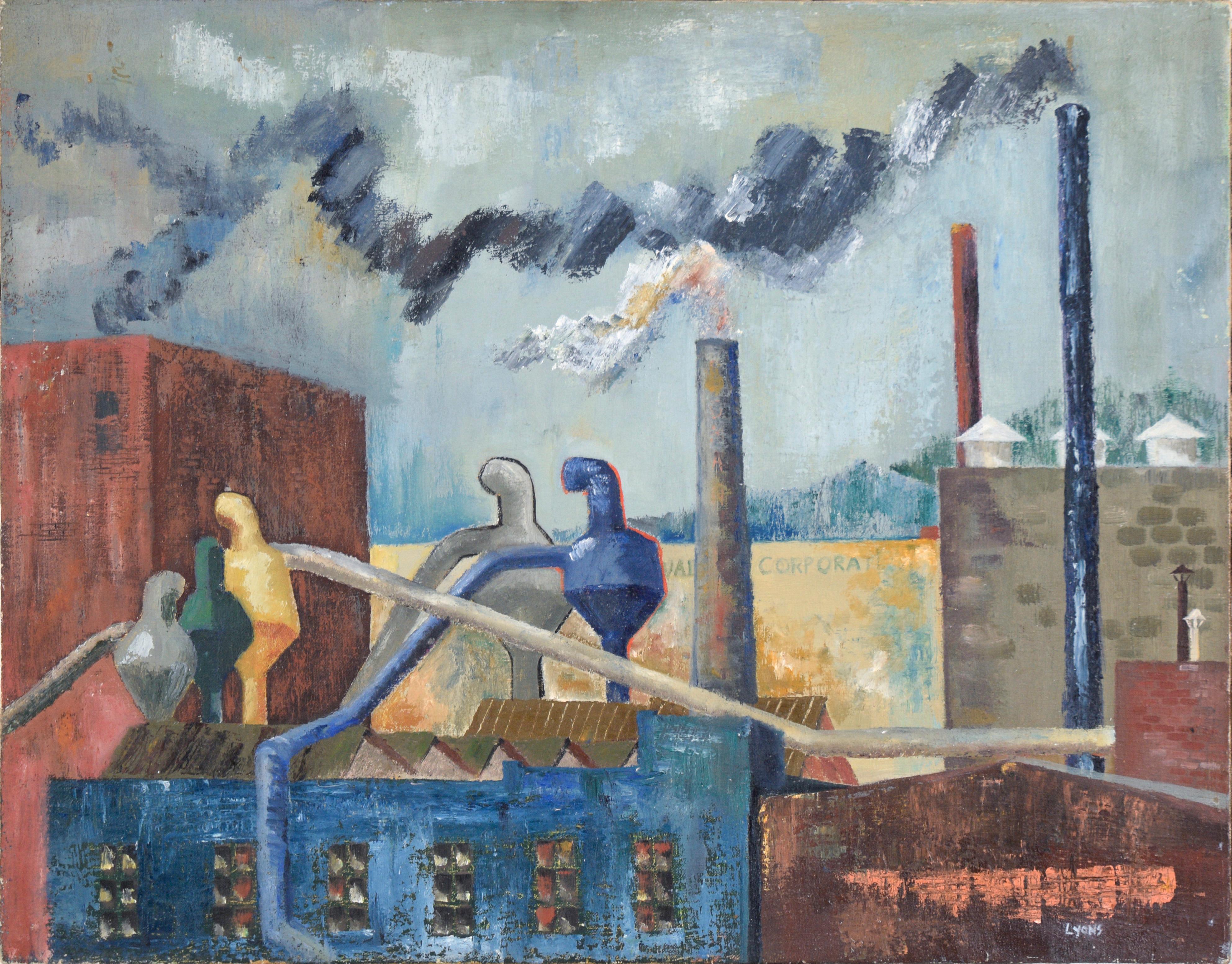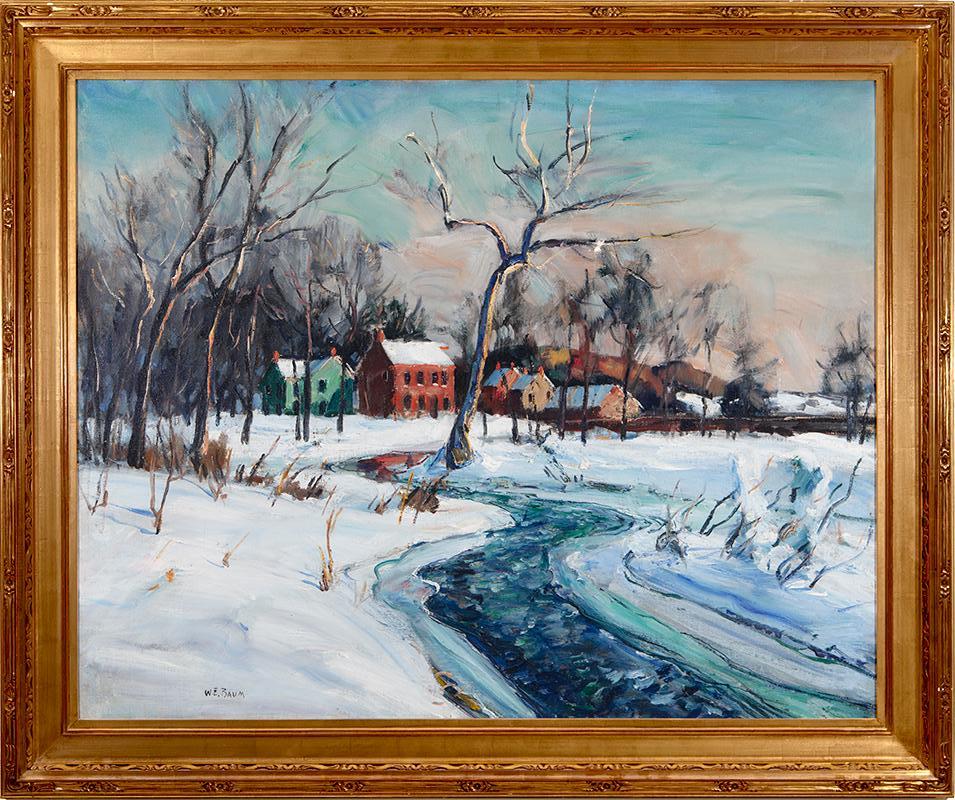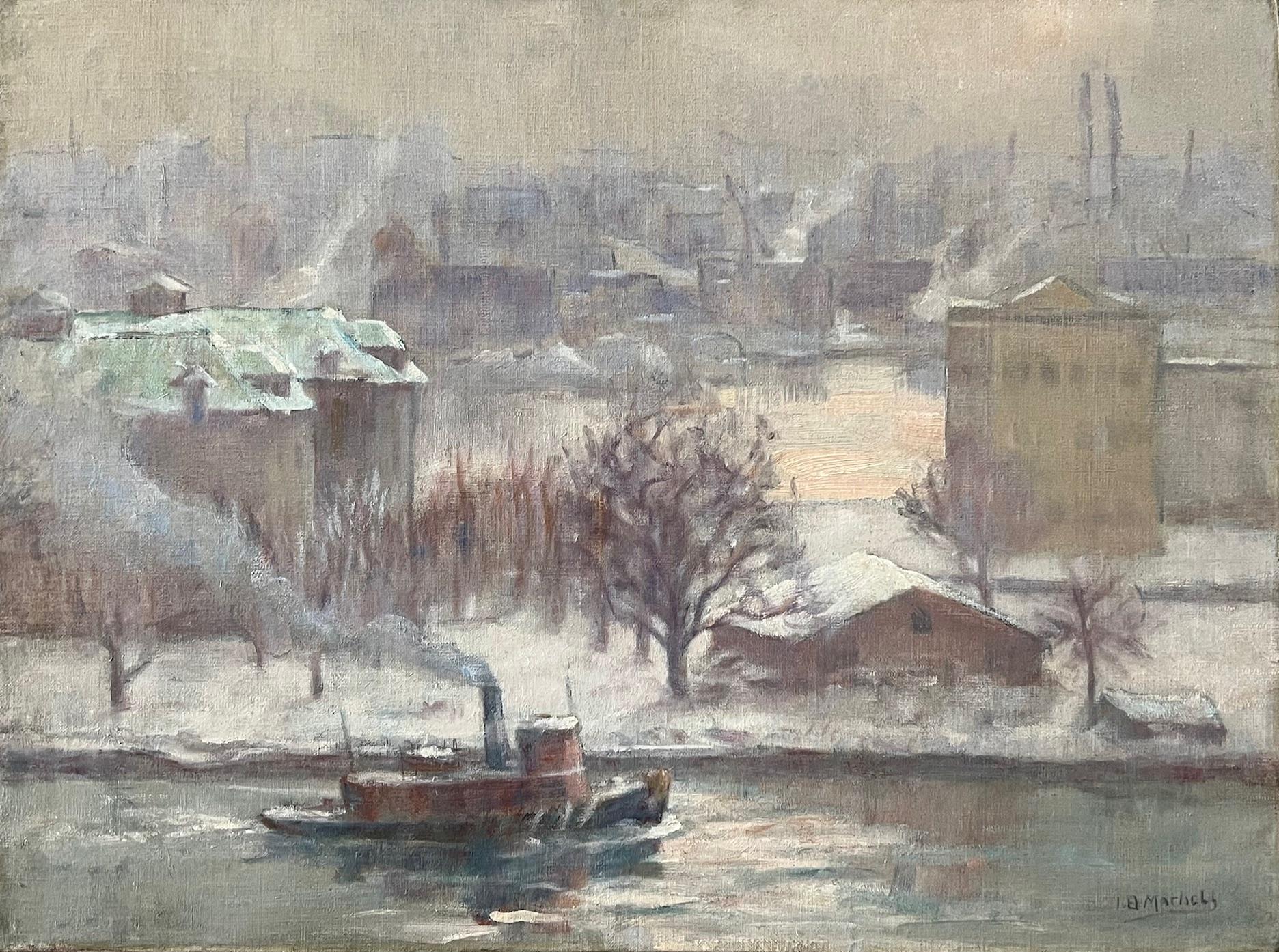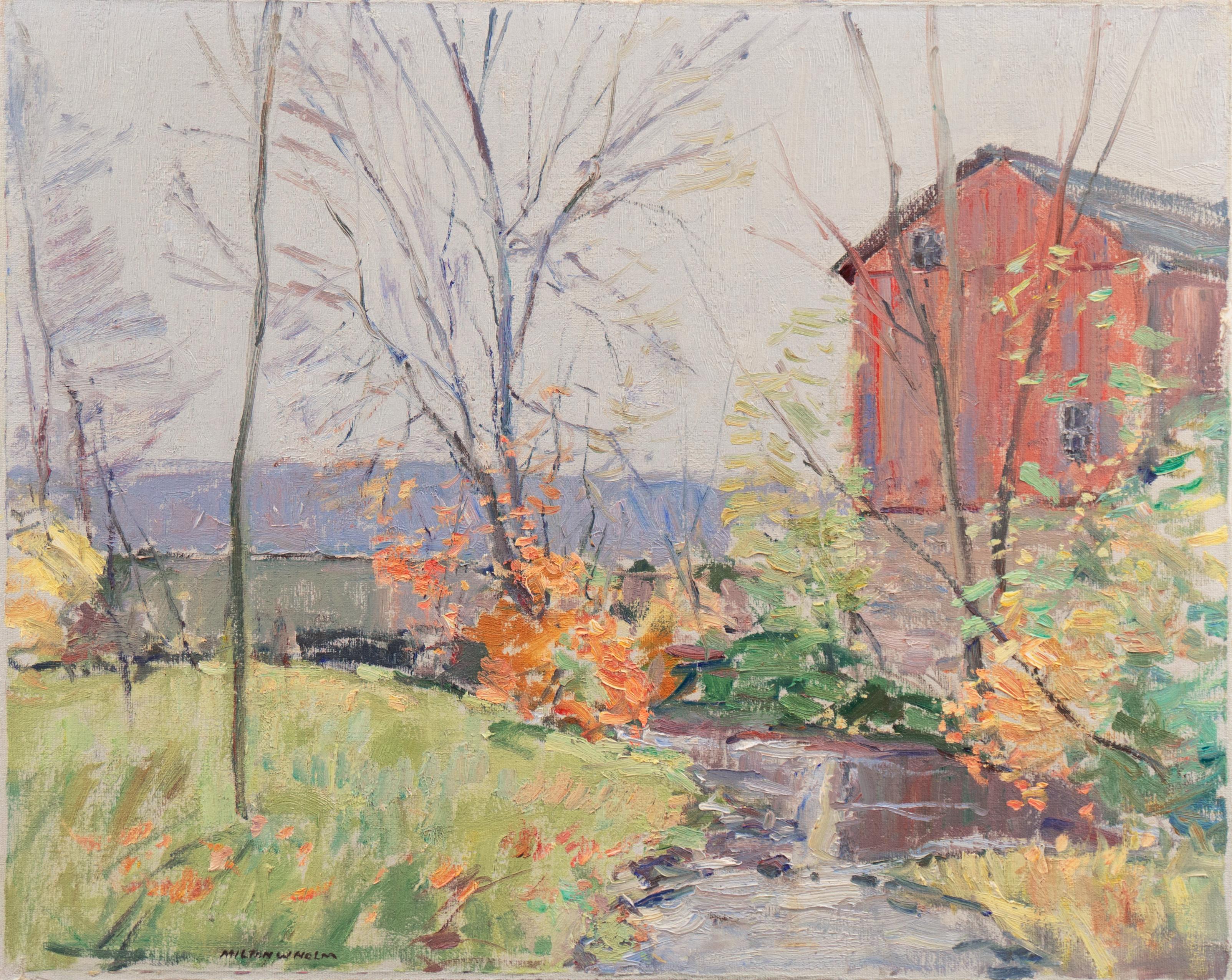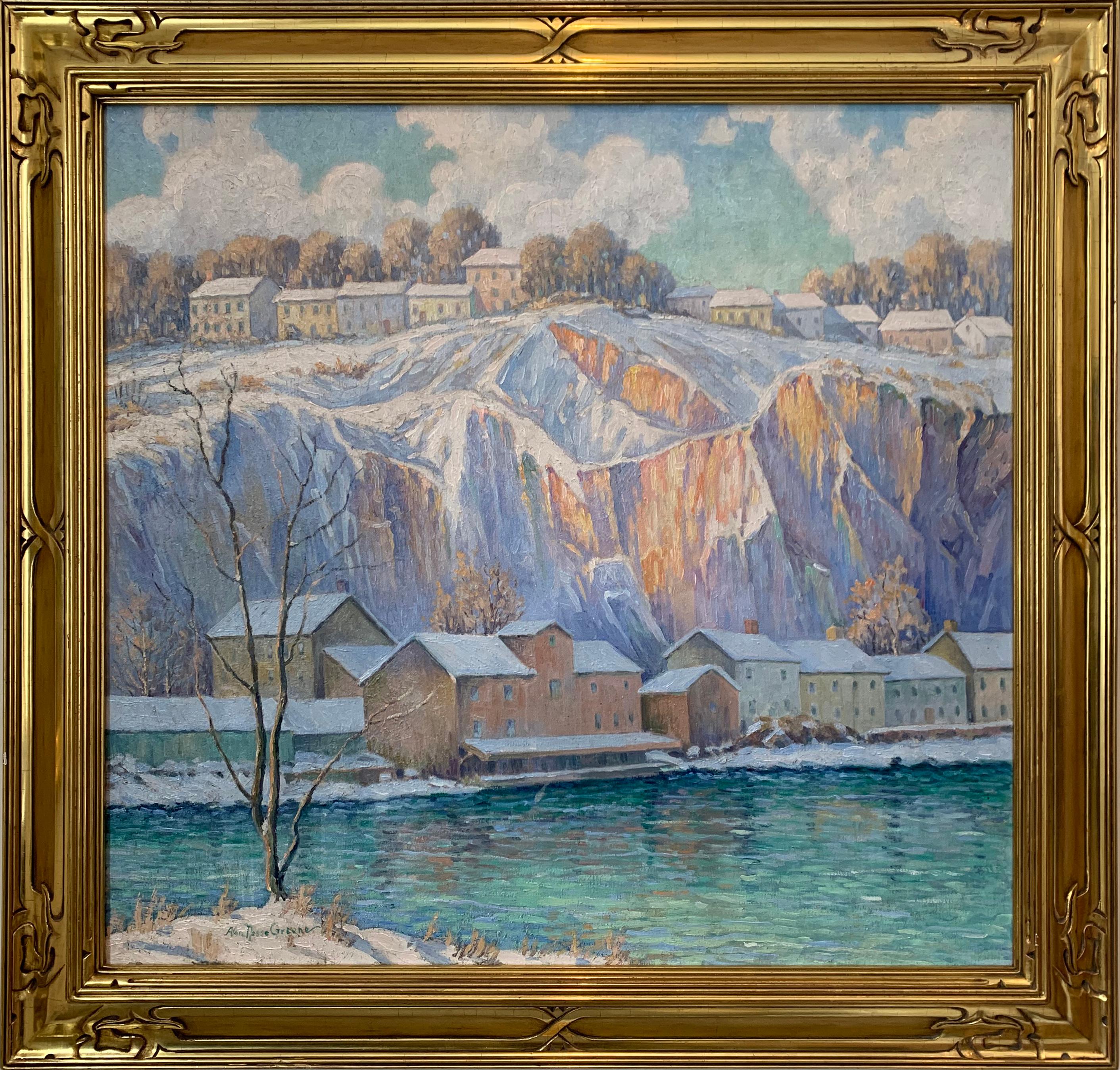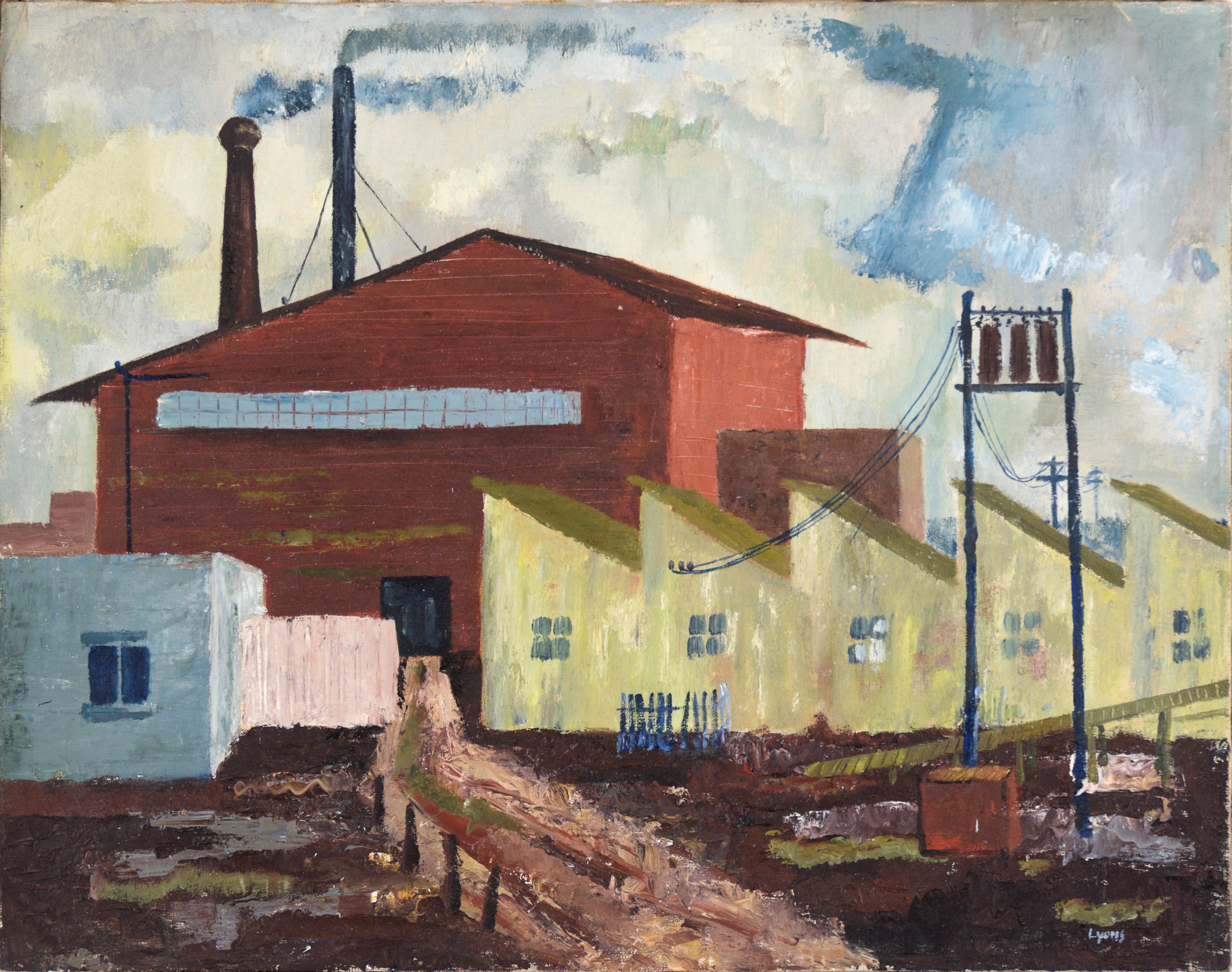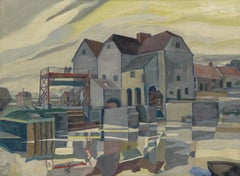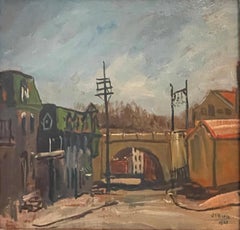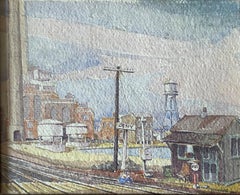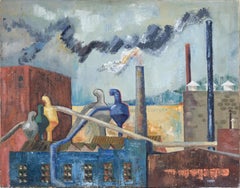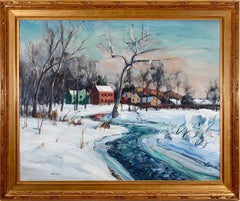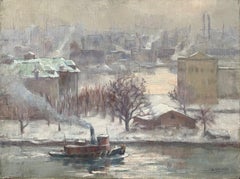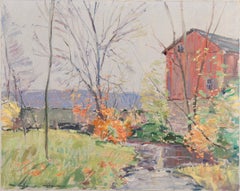Items Similar to "Factories on The River" Charles Vezin, Impressionist Industrialization
Want more images or videos?
Request additional images or videos from the seller
1 of 10
Charles Vezin"Factories on The River" Charles Vezin, Impressionist Industrialization
$8,000
£6,061.52
€6,955.11
CA$11,257.29
A$12,374.86
CHF 6,503.66
MX$150,275.87
NOK 81,131.51
SEK 76,866.40
DKK 51,907.75
About the Item
Charles Vezin
Factories on The River
Signed lower right
Oil on canvas board
12 x 13 15/16 inches
After spending half his years as a partner in a highly profitable wholesale dry-goods firm, Charles Vezin turned to painting and made it his career for the rest of his life. “I shook off the shackles of business to become a free man, with nothing to consider but the joy of work,” he said of his shift. He studied at the Art Students League and, forming strong likes and dislikes in the various fields of painting, expressed his opinions freely and with vehemence on the side of conservatism. As a result he was perhaps better known as a pamphleteer and a controversialist than as a painter. In 1921, for example, he hotly attacked an exhibition of impressionist and post-impressionist works at the Metropolitan Museum of Art. These terrific blasts against the newer movements in art he caused to be printed and widely distributed. As a painter he lived to see his works in many of the larger galleries and was a faithful exhibitor in the members’ shows at the Century. He served as President of the Art Students League from 1911 to 1915. In his painting years he made his home in Lyme, Conn.
- Creator:Charles Vezin (1858 - 1942, American)
- Dimensions:Height: 15 in (38.1 cm)Width: 18.75 in (47.63 cm)
- More Editions & Sizes:Unique WorkPrice: $8,000
- Medium:
- Movement & Style:
- Period:
- Condition:
- Gallery Location:New York, NY
- Reference Number:1stDibs: LU1841215195122
About the Seller
5.0
Platinum Seller
Premium sellers with a 4.7+ rating and 24-hour response times
Established in 2022
1stDibs seller since 2022
122 sales on 1stDibs
Typical response time: <1 hour
- ShippingRetrieving quote...Shipping from: New York, NY
- Return Policy
Authenticity Guarantee
In the unlikely event there’s an issue with an item’s authenticity, contact us within 1 year for a full refund. DetailsMoney-Back Guarantee
If your item is not as described, is damaged in transit, or does not arrive, contact us within 7 days for a full refund. Details24-Hour Cancellation
You have a 24-hour grace period in which to reconsider your purchase, with no questions asked.Vetted Professional Sellers
Our world-class sellers must adhere to strict standards for service and quality, maintaining the integrity of our listings.Price-Match Guarantee
If you find that a seller listed the same item for a lower price elsewhere, we’ll match it.Trusted Global Delivery
Our best-in-class carrier network provides specialized shipping options worldwide, including custom delivery.More From This Seller
View All"Factory on the River" Modernist and Precisionist WPA Industrial New York Scene
By William Sharp
Located in New York, NY
William Sharp (1900 - 1961)
Factory on the River
Oil on canvas
17 1/2 x 23 1/4 inches
Initialed lower right: WS
Provenance:
Estate of the artist
Private Collection, New York
Swann Auction Galleries, American Art, June 13, 2019, Lot 178
William Sharp was born on June 13, 1900, in Lemberg, Austria, where he attended college and the Academy for Arts and Industry. He later studied in Kraków, Poland, and in Berlin and Munich, Germany. Sharp began his career as a designer of stained-glass windows and as a painter of murals. He served in the German army during World War I. After the war he became a newspaper artist in Berlin and a well-known etcher.
Sharp drew political cartoons that were bitterly critical of the growing Nazi movement. As the influence of National Socialism intensified, he began to contribute drawings, under a pseudonym, to publications that were hostile to Hitler. After Hitler assumed power, Sharp was confronted with these drawings and told that he would be sent to a concentration camp. However, in 1934, he escaped to the United States.
His first newspaper assignment in America was making courtroom sketches for The New York Mirror...
Category
Mid-20th Century American Realist Landscape Paintings
Materials
Canvas, Paint, Oil
"Manayunk" Walter Emerson Baum, Pennsylvania Impressionist Landscape of Manayunk
By Walter Emerson Baum
Located in New York, NY
Walter Emerson Baum
Manayunk, 1953
Signed and dated lower right; titled and dated on the reverse
Oil on board
12 x 14 inches
Walter Baum was born December 14, 1884 in Sellersville,...
Category
1950s American Impressionist Figurative Paintings
Materials
Oil, Board
"La Seine Fumee bleu, " William Samuel Horton, France, American Impressionism
By William Samuel Horton
Located in New York, NY
William Samuel Horton (1865 - 1936)
La Seine Fumee bleu, Paris, France, circa 1909
Oil on canvasboard
17 x 21 inches
Signed lower left
A landscape painter, William Horton lived and ...
Category
Early 1900s American Impressionist Landscape Paintings
Materials
Oil, Board
"Train Station, " Max Kuehne, Industrial City Scene, American Impressionism
By Max Kuehne
Located in New York, NY
Max Kuehne (1880 - 1968)
Train Station, circa 1910
Watercolor on paper
8 1/4 x 10 1/4 inches
Signed lower right
Provenance:
Private Collection, Illinois
Max Kuehne was born in Halle, Germany on November 7, 1880. During his adolescence the family immigrated to America and settled in Flushing, New York. As a young man, Max was active in rowing events, bicycle racing, swimming and sailing. After experimenting with various occupations, Kuehne decided to study art, which led him to William Merritt Chase's famous school in New York; he was trained by Chase himself, then by Kenneth Hayes Miller. Chase was at the peak of his career, and his portraits were especially in demand. Kuehne would have profited from Chase's invaluable lessons in technique, as well as his inspirational personality. Miller, only four years older than Kuehne, was another of the many artists to benefit from Chase's teachings. Even though Miller still would have been under the spell of Chase upon Kuehne's arrival, he was already experimenting with an aestheticism that went beyond Chase's realism and virtuosity of the brush. Later Miller developed a style dependent upon volumetric figures that recall Italian Renaissance prototypes.
Kuehne moved from Miller to Robert Henri in 1909. Rockwell Kent, who also studied under Chase, Miller, and Henri, expressed what he felt were their respective contributions: "As Chase had taught us to use our eyes, and Henri to enlist our hearts, Miller called on us to use our heads." (Rockwell Kent, It's Me O Lord: The Autobiography of Rockwell Kent. New York: Dodd, Mead and Co., 1955, p. 83). Henri prompted Kuehne to search out the unvarnished realities of urban living; a notable portion of Henri's stylistic formula was incorporated into his work.
Having received such a thorough foundation in art, Kuehne spent a year in Europe's major art museums to study techniques of the old masters. His son Richard named Ernest Lawson as one of Max Kuehne's European traveling companions. In 1911 Kuehne moved to New York where he maintained a studio and painted everyday scenes around him, using the rather Manet-like, dark palette of Henri.
A trip to Gloucester during the following summer engendered a brighter palette. In the words of Gallatin (1924, p. 60), during that summer Kuehne "executed some of his most successful pictures, paintings full of sunlight . . . revealing the fact that he was becoming a colorist of considerable distinction." Kuehne was away in England the year of the Armory Show (1913), where he worked on powerful, painterly seascapes on the rocky shores of Cornwall. Possibly inspired by Henri - who had discovered Madrid in 1900 then took classes there in 1906, 1908 and 1912 - Kuehne visited Spain in 1914; in all, he would spend three years there, maintaining a studio in Granada. He developed his own impressionism and a greater simplicity while in Spain, under the influence of the brilliant Mediterranean light. George Bellows convinced Kuehne to spend the summer of 1919 in Rockport, Maine (near Camden). The influence of Bellows was more than casual; he would have intensified Kuehne's commitment to paint life "in the raw" around him.
After another brief trip to Spain in 1920, Kuehne went to the other Rockport (Cape Ann, Massachusetts) where he was accepted as a member of the vigorous art colony, spearheaded by Aldro T. Hibbard. Rockport's picturesque ambiance fulfilled the needs of an artist-sailor: as a writer in the Gloucester Daily Times explained, "Max Kuehne came to Rockport to paint, but he stayed to sail." The 1920s was a boom decade for Cape Ann, as it was for the rest of the nation. Kuehne's studio in Rockport was formerly occupied by Jonas Lie.
Kuehne spent the summer of 1923 in Paris, where in July, André Breton started a brawl as the curtain went up on a play by his rival Tristan Tzara; the event signified the demise of the Dada movement. Kuehne could not relate to this avant-garde art but was apparently influenced by more traditional painters — the Fauves, Nabis, and painters such as Bonnard. Gallatin perceived a looser handling and more brilliant color in the pictures Kuehne brought back to the States in the fall. In 1926, Kuehne won the First Honorable Mention at the Carnegie Institute, and he re-exhibited there, for example, in 1937 (Before the Wind). Besides painting, Kuehne did sculpture, decorative screens, and furniture work with carved and gilded molding. In addition, he designed and carved his own frames, and John Taylor Adams encouraged Kuehne to execute etchings. Through his talents in all these media he was able to survive the Depression, and during the 1940s and 1950s these activities almost eclipsed his easel painting. In later years, Kuehne's landscapes and still-lifes show the influence of Cézanne and Bonnard, and his style changed radically.
Max Kuehne died in 1968. He exhibited his work at the National Academy of Design, the Art Institute of Chicago, the Carnegie Institute in Pittsburgh, the Memorial Art Gallery of the University of Rochester, and in various New York City galleries. Kuehne's works are in the following public collections: the Detroit Institute of Arts (Marine Headland), the Whitney Museum (Diamond Hill...
Category
1910s American Impressionist Landscape Drawings and Watercolors
Materials
Paper, Watercolor
"Colonial Sand and Stone Company, New York, " Industrial WPA Scene, Precisionist
By William Sharp
Located in New York, NY
William Sharp (1900 - 1961)
Factory on the River
Oil on canvas
20 1/2 x 28 1/2 inches
Initialed lower left: WS
Provenance:
Estate of the artist
Private Collection, New York
Swann Auction Galleries, American Art, June 13, 2019, Lot 178
Private Collection, New York
Colonial Sand and Stone Co., founded by Generoso Pope, was once the country’s largest sand and gravel business, providing the concrete for much of New York City’s skyline, including the Empire State Building, Rockefeller Center, Radio City Music Hall, airports and subways.
William Sharp was born on June 13, 1900, in Lemberg, Austria, where he attended college and the Academy for Arts and Industry. He later studied in Kraków, Poland, and in Berlin and Munich, Germany. Sharp began his career as a designer of stained-glass windows and as a painter of murals. He served in the German army during World War I. After the war he became a newspaper artist in Berlin and a well-known etcher.
Sharp drew political cartoons that were bitterly critical of the growing Nazi movement. As the influence of National Socialism intensified, he began to contribute drawings, under a pseudonym, to publications that were hostile to Hitler. After Hitler assumed power, Sharp was confronted with these drawings and told that he would be sent to a concentration camp. However, in 1934, he escaped to the United States.
His first newspaper assignment in America was making courtroom sketches for The New York Mirror...
Category
Mid-20th Century American Realist Landscape Paintings
Materials
Canvas, Paint, Oil
"French Landscape" Wilson Irvine, American Impressionist Rural French Town
Located in New York, NY
Wilson Irvine
French Landscape, circa 1908
Signed lower right
Oil on canvas
29 x 36 inches
A prolific Impressionist with a penchant for atmospheric scenes, Illinois native Wilson I...
Category
Early 1900s American Impressionist Figurative Paintings
Materials
Canvas, Oil
You May Also Like
Factories - Industrial Landscape in Oil on Linen
Located in Soquel, CA
Factories - Industrial Landscape in Oil on Linen
Bold industrial landscape by Doris Lyons Hoover (American, 1927-2014). A large red building sits at the left edge of the composition with a grey building across the composition to the right. Three smokestacks let of smoke or steam, surrounded by piping and tanks running throughout the scene.
Signed "Lyons" in the lower right corner and on verso.
Canvas size: 24"H x 30"W
No frame.
Doris Lyons Hoover (American, 1927-2014) was born in Fort Payne, Alabama, on Oct. 8, 1927, on her grandparents' farm. She was raised in Chattanooga, Tennessee, and attended college at the University of Chattanooga, (now UTC) where she received honors in ar. At U.C. she met her husband Jack Hoover, and the couple moved to Palo Alto in 1954.
Doris Hoover became a nationally known fabric artist, teacher, lecturer and co-founder of the Peninsula Stitchery Guild, a leading organization in the Bay Area Crafts Movement of the 1970s. Her beautiful, often playful quilts, soft sculptures and creative stitchings grace homes...
Category
1960s American Impressionist Landscape Paintings
Materials
Linen, Oil
"Perkiomen Mills"
By Walter Emerson Baum
Located in Lambertville, NJ
Jim’s of Lambertville Fine Art Gallery is proud to present this piece by Walter Emerson Baum (1884 - 1956).
Born in Sellersville, Pennsylvania, Walter Baum was one of the only membe...
Category
1930s American Impressionist Landscape Paintings
Materials
Canvas, Oil
East River (Unititled)
By Isabella Banks Markell
Located in Los Angeles, CA
East River (Untitled), c. 1940s, oil on canvas signed lower right, 18 x 24 inches
Isabella Markell was a painter, etcher, and sculptor, who is best known for her New York City scen...
Category
1940s American Impressionist Landscape Paintings
Materials
Canvas, Oil
'Rochester, New York', National Academy of Design, Rockport Art Association, Oil
By Milton W. Holm
Located in Santa Cruz, CA
Signed lower left, 'Milton W. Holm' (American, 1903-1999) and painted circa 1960.
This notable American Impressionist was a long-time member of the Rochester Art Club and served as...
Category
1950s American Impressionist Landscape Paintings
Materials
Oil, Board
Winter Quarry River House, American Impressionist Snowy Landscape, Oil on Canvas
By Albert Van Nesse Greene
Located in Doylestown, PA
"Winter Sunset" is an Impressionist scene of homes along a snowy river and quarry landscape, painted by American artist Albert Van Nesse Greene. The painting is a 32" x 34" oil on ca...
Category
Early 20th Century American Impressionist Landscape Paintings
Materials
Oil, Canvas
Industrial Landscape with Row Houses in Oil on Linen
Located in Soquel, CA
Industrial Landscape with Row Houses in Oil on Linen
Bold industrial landscape by Doris Lyons Hoover (American, 1927-2014). A large red building with smoke...
Category
1960s American Impressionist Landscape Paintings
Materials
Linen, Oil
